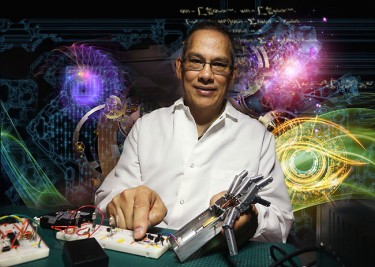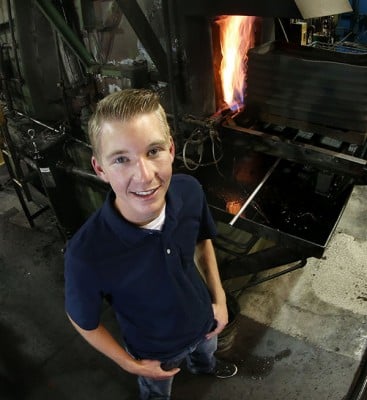Story by Michael Ferraresi
Photos by Darryl Webb
GCU News Bureau
Dr. Michael Sheller enjoyed seeing the reactions from engineers when he encouraged them to “stop thinking in terms of lectures and working problems out of a book.”
As he worked with fellow faculty members and Arizona industry leaders on curriculum for Grand Canyon University’s three new engineering programs, which this fall welcomed the pioneer wave of undergraduate students, the associate dean of the College of Science, Engineering and Technology said he often received reactions like, “Oh, you want it to be real.”
Yes, Sheller found himself reiterating — GCU wants its bachelor’s degree programs in biomedical, electrical and mechanical engineering to develop students in a way that reflects industry standards for project management, interdisciplinary overlap and technology standards. He wants to make sure the first wave of Lope engineers will be prepared to fill workforce needs immediately.
(Click here to read more about the programs’ emphases.)
“Every engineer outside of academia gets very excited when I describe that,” said Sheller, a longtime biomedical engineer and entrepreneur who was drawn to GCU a year ago by the opportunity to build engineering programs from scratch and link those programs into the Christian fabric of the University. “They’ll say something like, ‘This is exactly what I’ve always dreamed of for a university.’”
At academic conferences this summer, looking at it through the average undergraduate’s perspective, Sheller quickly saw how students could be overloaded with information in traditional engineering programs or feel disconnected from the craft, especially if they miss the real-world applications of physics, statics, dynamics, mathematics and other complex scientific concepts.
To combat that challenge, Sheller and his GCU colleagues developed engineering programs that combine classical, authoritative principles with a more collaborative lab space to prepare students for the rigors of their disciplines.
The University opened a four-story engineering building, the first of two on its campus, this summer. As the program develops, new labs will be outfitted with atomic microscopes, voltmeters and other equipment, enabling students to work together on cross-disciplinary projects. For example, students in GCU’s College of Nursing and Health Care Professions or Colangelo College of Business could collaborate with CSET engineering, computer science or information technology students early in their programs.
“I say, ‘Get them engaged,’” Sheller said. “I think what GCU is building is more reflective of industry practice.”
Lectures and interactive exercises are essential to teaching and learning, Sheller agreed, but he and others have sought to design a curriculum that equips students to navigate the work environments in which they soon will find themselves.
“They just don’t know how to work together or to be driven by a project management schedule,” said Sheller, who received that feedback time and time again from industry leaders about the readiness of new engineering graduates in Arizona to fill key jobs.
“So are you providing a learning environment or creating an industry-ready student? That’s what educators really grapple with.”
Starting early
GCU already was putting students in the workforce before the program had even started. Case in point: sophomore Joel Conrad.
Growing up in Phoenix, Conrad developed his interest in engineering by working on his family’s dirt bikes. He took parts off the Kawasaki two-stroke and Yamaha 500 and dreamed of customizing his own vehicles someday, perhaps as an engineer for an auto manufacturer.
Knowing GCU eventually would offer engineering degrees, the 19-year-old began as a freshman in the new computer science program but looked forward to transferring into mechanical engineering.
“I was drawn to that since it’s a little broader (than biomedical or electrical),” said Conrad, who was homeschooled through high school. “I wanted to take my interests a step further, from mechanics into engineering.”
Before beginning his engineering studies, Conrad already had worked with GCU faculty to land a summer internship at Phoenix Heat Treating, an engineering firm with aerospace contracts that deal with everything from airplane landing gears to satellite parts. The University plans to funnel more interns into local companies to experience the realworld applications of principles from their classrooms.
Conrad’s summer internship required him to test and calibrate furnaces that run as hot as 2,300 F. But he learned how to run base tests on systems, making sure the furnaces were accurately calibrated for temperature uniformity. He also helped upgrade controls and bring new furnaces online while honing the professional soft skills many employers desire in their entry-level staff.
Conrad said he chose GCU for its Christian worldview, which would help him ultimately “respect God’s creation” in everything he does as an engineer.
Astounding demand
Last summer, Sheller joined CSET Dean Dr. Mark Wooden and other faculty to develop the curriculum and set a foundation for GCU’s future technology and engineering academics. But the University began tapping the industry for input three years ago.
Leaders have joined various GCU advisory boards to share their advice on the technology, programs and skills they expect their employees and colleagues to understand. (Click here to read about one board member who's using advancements in technology to improve the health of his son, a GCU student.) From startup entrepreneurs to high school science teachers to the directors of tech companies, the feedback was overwhelming proof that students must be prepared to work right out of college.
Studies in the past year have shown that the national demand for STEM jobs will grow by as much as 26 percent through 2020. Locally, the industries of aerospace and defense, technology and innovation, renewable energy, bioscience and health care, optics and photonics, and advanced manufacturing are key sectors for ongoing job growth, according to the Arizona Commerce Authority.
The Greater Phoenix Economic Council reported that “biomedical jobs are growing three times faster here than the national average” and that more than 20,000 jobs in health care and personalized medicine have been created since 2007 in the Phoenix metropolitan area.
Dr. Mike Mobley, executive director of GCU’s Center for Integrated Science, Engineering and Technology, characterized Arizona’s need for technically sound electrical and mechanical engineers as significant, too, based on technology workforce reports. GCU wanted to address the challenge of retaining STEM-minded local students to meet those local needs.
“To keep students involved with STEM, we’re learning not to discourage them really quickly with theoretical classes in math and science, but to engage them in a problem-solving atmosphere and exciting hands-on activities … and weave in those theories as they go, so they’re more likely to stick around longer and finish their degrees,” said Mobley, who came to GCU two years ago.
For Sheller, the advent of GCU’s programs has allowed him to tap longtime colleagues such as Tim Stippick for ideas. The engineering entrepreneur, who runs Escape Velocity Mechanical Design in Phoenix, has contributed his ideas to Sheller’s engineering course design.
Stippick agreed to develop a prototype for a robotic hand that students will program in their course and lab, “Success in Computer Science, Engineering and Technology.” Sheller, who has collaborated with Stippick on numerous biomedical devices, said the project would merge the various engineering disciplines with computer science for an overview of programming a machine with logic that makes it mimic human movement.
That’s powerful stuff for a group of freshmen to experience so early in their collegiate careers.
And with that, by programming a machine to do something as simple as clench a fist or flash a Lopes Up, students can see what it means for a team to create from scratch — and the responsibility that goes along with it.





































































